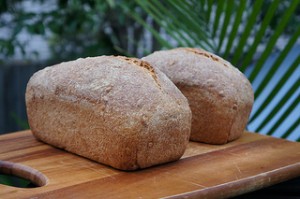New evidence from the Danish Cancer Society Research Center, Copenhagen has confirmed that whole grain foods made from wheat and rye significantly reduce the risk of colon cancer.
The researchers followed 1,372 colorectal cancer patients together with 1,372 matched healthy persons as part of the European Prospective Investigation into Cancer and Nutrition study.
To confirm whole grain wheat and rye consumption the researchers measured blood levels of alkylresorcinols – phenolic lipids consumed almost exclusively from the bran of cereal grasses wheat and rye.
The researchers found that those with the highest 25% of alkylresorcinols in their bloodstream had a 52% lower incidence of distal colon cancer, with the lowest risk ranging from a 72% lower incidence.
Furthermore, among Scandinavians, higher levels of alkylresorcinols had a 27% reduced incidence of all types of colon cancer.
Furthermore, their research found that among populations that ate greater amounts of alkylresorcinols – notably Central Europe and Scandinavian countries – there was a clear relationship. This of course means that it isn’t about eating a few meals here and there with whole wheat and rye: Rather, it is about consistently including whole grains in the diet.
The researchers stated this clearly:
“Plasma alkylresorcinols concentrations were associated with colon and distal colon cancer only in Central Europe and Scandinavia (ie, areas where alkylresorcinol levels were higher).”
Those areas where “alkylresorcinol levels were higher” relate to regions where more whole-grain wheats are consumed. Other regions of Europe and among many other western countries, wheat products consumed are primarily from white (refined) flours, which contain little alkylresorcinol content.
Other studies confirm whole grain wheat helps prevent colon cancer
This is not the first study to correlate reduced colon cancer incidence with the consumption of whole-grain wheat. A larger study from the Danish Cancer Society Research Center followed 108,000 Danish, Swedish, and Norwegian persons for eleven years. From this population 1,123 were diagnosed with colorectal cancer during the 11 years.
As the researchers analyzed their diets, they found that the consistent (daily) consumption of whole-grain wheat foods, including whole-grain breads and cereals resulted in a 44% lower incidence of colorectal cancer among the population studied.
They did not find the same correlation among greater consumption of whole-grain oats.
What is it about whole wheat and rye that produce anti-cancer benefits?
One component, as mentioned above, is alkylresorcinol content. These are phenol lipids – a sort of fat – that are found mainly in the outer layers (such as the pericarp) of the bran of kernels of Triticum aestivum (wheat) and Triticum durum (durum wheat which is used to make pasta) as well as Secale cereale (rye). Rice has been found to contain alkylresorcinols but rice’s alkylresorcinols are contained in the strands not the kernels.
The research has shown that alkylresorcinols have numerous biological effects, including curbing mutagenic activity and inhibiting carcinogenic enzymes in the gut. They also have been shown to have antifungal activities.
But another component of whole-grain wheat is something we have investigated before – that of supplying a certain prebiotic called arabinoxylan oligosaccharide that promotes the growth of probiotic bacteria. Several studies have shown certain gut probiotics reduce levels of colon-cancer related enzymes such as beta-glucosidase and beta-glucuronidase.
Learn more about how probiotics help prevent cancer.
As to whether the anti-cancer benefits of wheat come from its prebiotic content or its alkylresorcinol content has not been fully determined. It is likely to be both.
The bottom line is that when looked at from a larger perspective, whole grain wheat is a healthy food.
REFERENCES:
Kyrø C, Olsen A, Landberg R, Skeie G, Loft S, Åman P, Leenders M, Dik VK, Siersema PD, Pischon T, Christensen J, Overvad K, Boutron-Ruault MC, Fagherazzi G, Cottet V, Kühn T, Chang-Claude J, Boeing H, Trichopoulou A, Bamia C, Trichopoulos D, Palli D, Krogh V, Tumino R, Vineis P, Panico S, Peeters PH, Weiderpass E, Bakken T, Åsli LA, Argüelles M, Jakszyn P, Sánchez MJ, Amiano P, Huerta JM, Barricarte A, Ljuslinder I, Palmqvist R, Khaw KT, Wareham N, Key TJ, Travis RC, Ferrari P, Freisling H, Jenab M, Gunter MJ, Murphy N, Riboli E, Tjønneland A, Bueno-de-Mesquita HB. Plasma alkylresorcinols, biomarkers of whole-grain wheat and rye intake, and incidence of colorectal cancer. J Natl Cancer Inst. 2014 Jan;106(1):djt352. doi: 10.1093/jnci/djt352.
Kyrø C, Skeie G, Loft S, Landberg R, Christensen J, Lund E, Nilsson LM, Palmqvist R, Tjønneland A, Olsen A. Intake of whole grains from different cereal and food sources and incidence of colorectal cancer in the Scandinavian HELGA cohort. Cancer Causes Control. 2013 Jul;24(7):1363-74. doi: 10.1007/s10552-013-0215-z.
Céspedes CL, et al. Natural Antioxidants and Biocides from Wild Medicinal Plants, CABI, 2013.
Hatakka K, Holma R, El-Nezami H, Suomalainen T, Kuisma M, Saxelin M, Poussa T, Mykkänen H, Korpela R. The influence of Lactobacillus rhamnosus LC705 together with Propionibacterium freudenreichii ssp. shermanii JS on potentially carcinogenic bacterial activity in human colon. Int J Food Microbiol. 2008 Dec 10;128(2):406-10. doi: 10.1016/j.ijfoodmicro.2008.09.010.
Image credit: Bart Everson
Adams C. Probiotics – Protection Against Infection. Logical Books, 2011.

